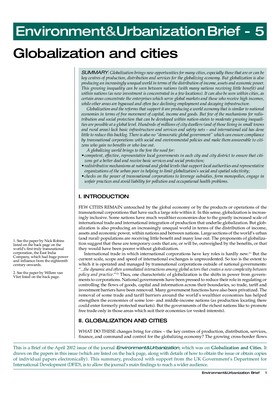Globalization and Cities

Brief of the April 2002 issue of E&U. Globalization brings new opportunities for many cities, especially those that are or can be key centres of production, distribution and services for the globalizing economy. But globalization is also producing an increasingly unequal world in terms of the distribution of income, assets and economic power. This growing inequality can be seen between nations (with many nations receiving little benefit) and within nations (as new investment is concentrated in a few locations). It can also be seen within cities, as certain areas concentrate the enterprises which serve global markets and those who receive high incomes, while other areas are bypassed and often face declining employment and decaying infrastructure.
Globalization and the reforms that support it are producing a world economy that is similar to national economies in terms of free movement of capital, income and goods. But few of the mechanisms for redistribution and social protection that can be developed within nation-states to moderate growing inequalities are possible at a global level. Hundreds of millions of city dwellers (and of those living in small towns and rural areas) lack basic infrastructure and services and safety nets - and international aid has done little to reduce this backlog. There is also no “democratic global government” which can ensure compliance by transnational corporations with social and environmental policies and make them answerable to citizens who gain no benefits or who lose out.
Cite this publication
Available at https://www.iied.org/10513iied